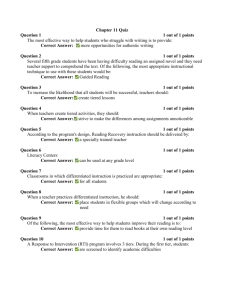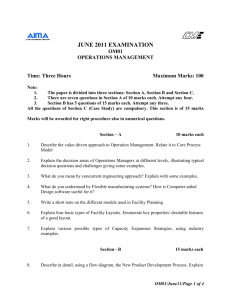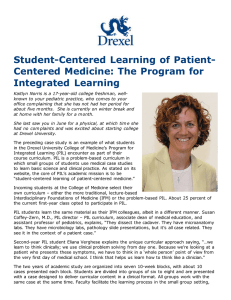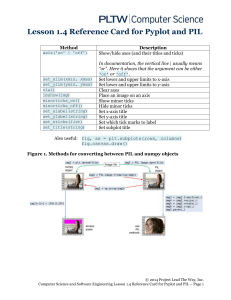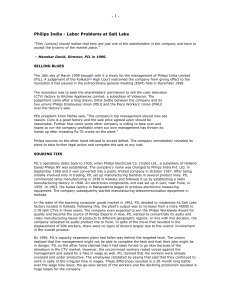Alyssa Archer McConnell Library, Radford University, Radford Virginia
advertisement
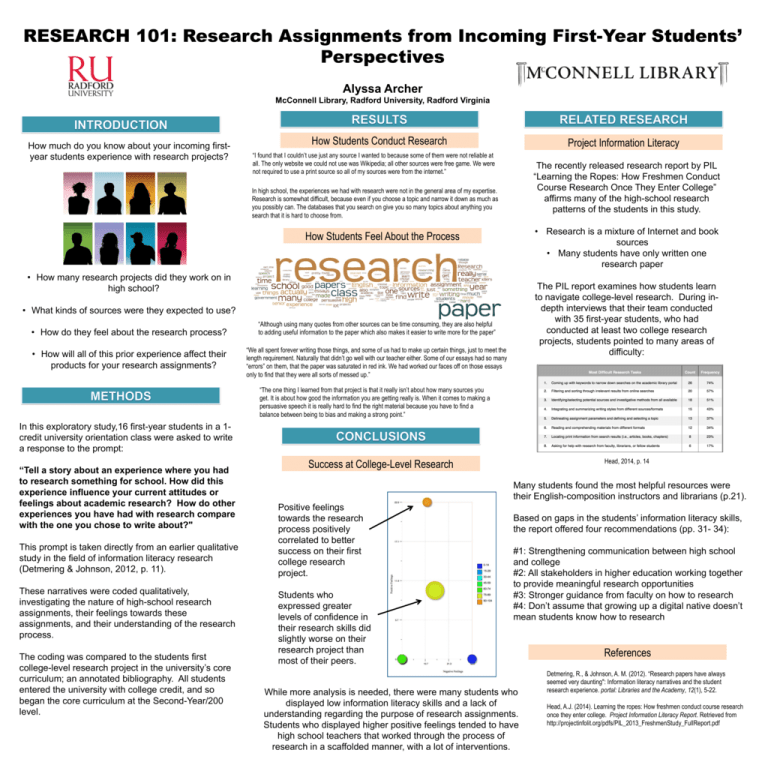
RESEARCH 101: Research Assignments from Incoming First-Year Students’ Perspectives Alyssa Archer McConnell Library, Radford University, Radford Virginia How much do you know about your incoming firstyear students experience with research projects? How Students Conduct Research Project Information Literacy “I found that I couldn’t use just any source I wanted to because some of them were not reliable at all. The only website we could not use was Wikipedia; all other sources were free game. We were not required to use a print source so all of my sources were from the internet.” The recently released research report by PIL “Learning the Ropes: How Freshmen Conduct Course Research Once They Enter College” affirms many of the high-school research patterns of the students in this study. In high school, the experiences we had with research were not in the general area of my expertise. Research is somewhat difficult, because even if you choose a topic and narrow it down as much as you possibly can. The databases that you search on give you so many topics about anything you search that it is hard to choose from. • Research is a mixture of Internet and book sources • Many students have only written one research paper How Students Feel About the Process • How many research projects did they work on in high school? The PIL report examines how students learn to navigate college-level research. During indepth interviews that their team conducted with 35 first-year students, who had conducted at least two college research projects, students pointed to many areas of difficulty: • What kinds of sources were they expected to use? • How do they feel about the research process? • How will all of this prior experience affect their products for your research assignments? “Although using many quotes from other sources can be time consuming, they are also helpful to adding useful information to the paper which also makes it easier to write more for the paper” “We all spent forever writing those things, and some of us had to make up certain things, just to meet the length requirement. Naturally that didn’t go well with our teacher either. Some of our essays had so many “errors” on them, that the paper was saturated in red ink. We had worked our faces off on those essays only to find that they were all sorts of messed up.” “The one thing I learned from that project is that it really isn’t about how many sources you get. It is about how good the information you are getting really is. When it comes to making a persuasive speech it is really hard to find the right material because you have to find a balance between being to bias and making a strong point.” In this exploratory study,16 first-year students in a 1credit university orientation class were asked to write a response to the prompt: “Tell a story about an experience where you had to research something for school. How did this experience influence your current attitudes or feelings about academic research? How do other experiences you have had with research compare with the one you chose to write about?" This prompt is taken directly from an earlier qualitative study in the field of information literacy research (Detmering & Johnson, 2012, p. 11). These narratives were coded qualitatively, investigating the nature of high-school research assignments, their feelings towards these assignments, and their understanding of the research process. The coding was compared to the students first college-level research project in the university’s core curriculum; an annotated bibliography. All students entered the university with college credit, and so began the core curriculum at the Second-Year/200 level. Head, 2014, p. 14 Success at College-Level Research Many students found the most helpful resources were their English-composition instructors and librarians (p.21). Positive feelings towards the research process positively correlated to better success on their first college research project. Students who expressed greater levels of confidence in their research skills did slightly worse on their research project than most of their peers. Based on gaps in the students’ information literacy skills, the report offered four recommendations (pp. 31- 34): #1: Strengthening communication between high school and college #2: All stakeholders in higher education working together to provide meaningful research opportunities #3: Stronger guidance from faculty on how to research #4: Don’t assume that growing up a digital native doesn’t mean students know how to research While more analysis is needed, there were many students who displayed low information literacy skills and a lack of understanding regarding the purpose of research assignments. Students who displayed higher positive feelings tended to have high school teachers that worked through the process of research in a scaffolded manner, with a lot of interventions. References Detmering, R., & Johnson, A. M. (2012). “Research papers have always seemed very daunting": Information literacy narratives and the student research experience. portal: Libraries and the Academy, 12(1), 5-22. Head, A.J. (2014). Learning the ropes: How freshmen conduct course research once they enter college. Project Information Literacy Report. Retrieved from http://projectinfolit.org/pdfs/PIL_2013_FreshmenStudy_FullReport.pdf
